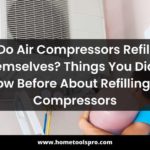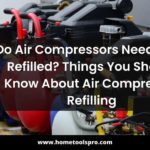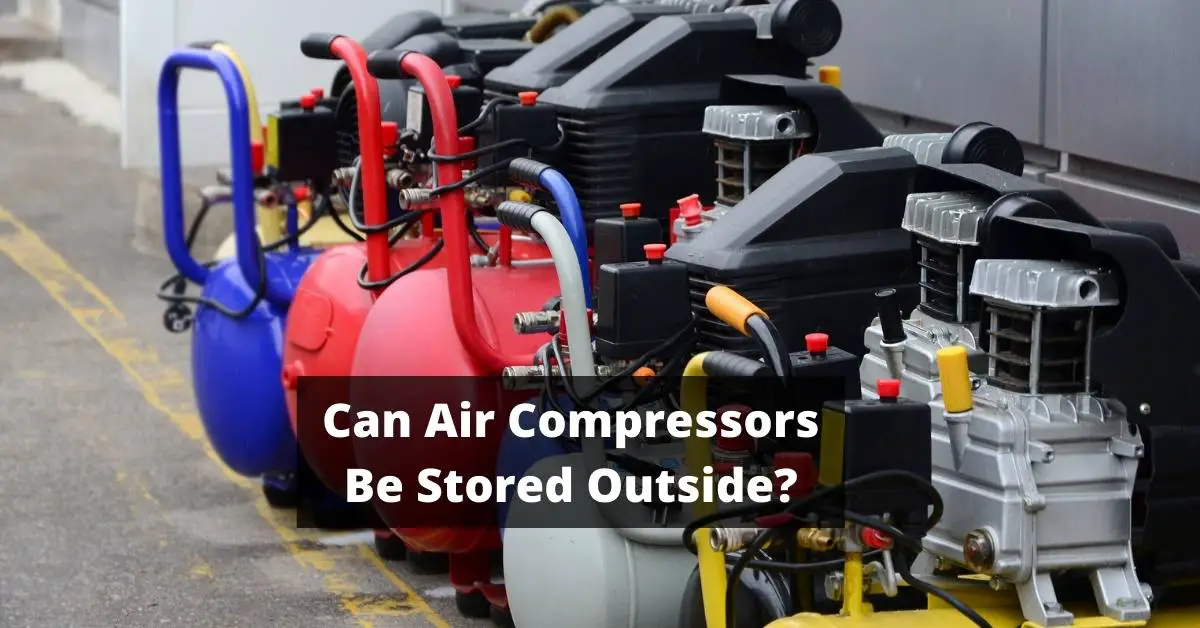As a professional mechanic, I know how crucial it is to have the right tools in my workshop. One of the most essential pieces of equipment that I rely on each day is my air compressor.
When it comes to air compressors, there are a variety of sizes and models available, but in this article, we will focus on 60 gallon vs 80 gallon air compressors.
If you’re considering purchasing an air compressor for your home or business, you may be wondering which size would be best for your needs. Both the 60 gallon and 80 gallon air compressors have their advantages and disadvantages, so it’s important to understand what sets them apart before making a decision.
In this article, we’ll compare these two popular sizes of air compressors and discuss which one might be the right choice for you.
Understanding Air Compressors
You need to understand how these machines work if you want to make the most out of them. Air compressors are powerful tools that can be used in a variety of ways, from inflating tires to powering pneumatic tools.
At their core, they work by taking in air and compressing it into a smaller space, which increases its pressure and allows it to be stored for later use. The main components of an air compressor include a motor, pump, tank, and various controls.
The motor powers the pump, which is responsible for compressing the air and storing it in the tank. The controls regulate things like pressure levels and airflow rate so that you can use your compressor effectively for different tasks.
Overall, understanding how an air compressor works is essential if you want to choose the right one for your needs. With this knowledge under your belt, you’ll be better equipped to compare different models like 60 gallon vs 80 gallon air compressors and make an informed decision about which one will work best for your particular situation.
Comparison of 60 gallon and 80 gallon air compressors
When it comes to air compressors, there are a few key factors that can greatly impact their performance and suitability for various tasks. In this discussion, I’ll be comparing 60 gallon and 80 gallon air compressors based on four important characteristics: tank size, power output, duty cycle, and price.
By understanding the differences between these two options in each of these areas, you’ll be better equipped to choose the right compressor for your needs.
Tank size
Well, isn’t it just fantastic that size doesn’t matter when it comes to tanks, said no one ever.
When it comes to air compressors, the tank size plays a crucial role in the overall performance of the machine. A larger tank means more compressed air can be stored and used for longer periods without the need for constant cycling of the motor. This translates into increased efficiency and reduced wear and tear on the machine.
In comparison, an 80-gallon air compressor offers greater storage capacity than its 60-gallon counterpart. This makes it ideal for heavy-duty applications that require prolonged use of compressed air such as sanding, painting, and grinding.
The larger tank also allows for more stable pressure regulation which is essential in ensuring consistent results throughout your project. However, a bigger tank also means a heavier machine that may not be suitable for smaller workspaces or those with limited mobility capabilities.
Moving on to power output…
Power output
Now, let’s talk about how much juice your machine is packing – the power output. The power output of an air compressor is measured in horsepower (HP).
Typically, a larger tank size will require a higher HP to fully pressurize it. So, if you’re looking at an 80 gallon air compressor, you’ll want to make sure that it has enough horsepower to handle the job you need it for.
For most home users and small businesses, a 5-7 HP motor will suffice for an 80 gallon air compressor. However, if you’re running heavy-duty tools or machinery that require high-pressure levels or continuous use, then you may need to consider a larger motor with more horsepower.
It’s important to note that using a motor with too little horsepower can lead to longer fill times and increased wear and tear on the machine over time.
When choosing an air compressor based on power output, make sure to take into consideration both the tank size and intended usage of the machine. This will ensure that you have enough power to complete your tasks efficiently without damaging your equipment.
Moving onto duty cycle…
Duty cycle
You’ll want to consider the duty cycle of your machine, which refers to how long it can run continuously before needing a break. Duty cycle is an important factor in determining the efficiency and productivity of your compressor. A higher-duty cycle machine can run for longer periods without overheating or wearing down, while a lower-duty cycle machine may need more frequent breaks.
When comparing 80 gallon air compressors, you’ll find that most have a duty cycle of around 50%. This means that they can run for half an hour before requiring a 30-minute rest period. However, some models offer better duty cycles, with some reaching up to 70%.
It’s important to assess how frequently you will be using your compressor and for what applications in order to determine the necessary duty cycle for your needs.
Moving on to price considerations…
Price
When it comes to cost, you’ll want to factor in the financial aspect of your investment. An 80 gallon air compressor generally costs more than a 60 gallon one. However, the price difference can vary depending on the brand, features, and quality of each model.
In general, an 80 gallon air compressor will cost around $1,000 – $2,000 while a 60 gallon one will cost around $500 – $1,500. It’s important to keep in mind that while an 80 gallon air compressor may have a higher upfront cost, it could potentially save you money in the long run due to its larger capacity and ability to handle heavier workloads.
Ultimately, when considering price as a factor in your decision-making process between an 80 gallon and a 60 gallon air compressor, it’s important to weigh the initial investment against potential benefits and long-term savings. With that said, let’s take a look at some advantages of a 60 gallon air compressor.
Advantages of a 60 gallon air compressor
With a 60 gallon tank, you can power your tools for longer periods of time and complete tasks without the need for constant breaks. This is because the larger tank size allows for more air storage, which means that the compressor doesn’t have to work as hard to keep up with demand. As a result, you can run your tools continuously for longer periods of time before needing to stop and wait for the compressor to catch up.
Another advantage of a 60 gallon air compressor is that it takes up less space than an 80 gallon model. This can be especially important if you’re working in a smaller garage or workshop where space is at a premium. Additionally, because these compressors are generally lighter than their larger counterparts, they’re easier to move around and transport from one location to another.
Finally, it’s worth noting that many 60 gallon air compressors are designed with portability in mind. Some models come equipped with wheels or handles that make them easy to move around as needed. This can be particularly useful if you need to take your compressor on-the-go or move it between different job sites.
Overall, there are many advantages to using a 60 gallon air compressor over an 80 gallon model – including increased portability, better efficiency, and greater ease of use. When it comes down to choosing between a 60 gallon air compressor and an 80 gallon model though, there are certainly some advantages to going with the larger option as well – which we’ll explore in the next section.
Advantages of an 80 gallon air compressor
The benefits of upgrading to an 80 gallon air compressor are numerous, providing enhanced performance and increased capabilities for heavy-duty tasks. With a larger tank capacity, the 80 gallon model is able to store more compressed air, allowing it to power tools that require sustained use such as sandblasters or paint sprayers. This means less downtime for refilling and greater efficiency in completing tasks.
Additionally, the higher CFM (cubic feet per minute) rating of an 80 gallon air compressor allows for faster tool operation and quicker completion of projects. The increased airflow also enables the use of larger pneumatic tools that may not be compatible with smaller compressors. This added power can greatly benefit those who work in automotive repair or metal fabrication.
Finally, the durability and longevity of an 80 gallon air compressor cannot be overlooked. With a heavier duty motor and stronger materials used in construction, these models are built to last longer than their smaller counterparts. Investing in an 80 gallon model ensures that you will have a reliable source of compressed air for years to come.
Moving on from the advantages of an 80 gallon air compressor, it’s important to consider the potential drawbacks of a smaller model such as the 60 gallon air compressor. Despite its lower price point and adequate performance for light-to-medium duty tasks, it may struggle with more demanding jobs requiring prolonged use or larger pneumatic tools.
Disadvantages of a 60 gallon air compressor
As someone who’s used a 60-gallon air compressor for various projects, I can attest to its limitations.
One major disadvantage is that it may not be suitable for larger operations.
In addition, the power output of a 60-gallon air compressor may be limited compared to larger models. This can impact efficiency and productivity.
May not be suitable for larger operations
You might find it challenging to run larger operations with this equipment. While a 60 gallon air compressor is suitable for most small and medium-sized tasks, it may not be sufficient for bigger projects that require more power.
This is especially true if you’re running a business or workshop that involves heavy-duty work like sandblasting, painting, or auto repair. One of the main reasons why a 60 gallon air compressor may not be suitable for larger operations is its limited tank capacity and power output.
Since the tank can only hold up to 60 gallons of compressed air, it may run out quickly when used continuously for extended periods. This means that you’ll have to wait for the tank to refill before continuing with your work, which can cause delays and affect productivity.
Additionally, the motor’s horsepower rating may not be enough to handle high-demand tasks, leading to slower performance and longer cycle times. As such, you might want to consider upgrading to an 80-gallon air compressor if you need more power and capacity for your operations.
Limited power output
If you want to tackle heavy-duty tasks that require more power, upgrading to a larger tank capacity and stronger motor might be the best solution. The 80 gallon air compressor has a limited power output, which makes it unsuitable for large-scale industrial operations.
It can handle basic tasks such as inflating tires, powering tools like sanders and grinders, and painting small surfaces. However, if you need to run multiple high-demand tools at the same time or operate for longer periods without stopping to refill the tank, then you may need something more powerful.
One of the reasons why an 80 gallon air compressor has limited power is because of its motor size. While it may have a decent horsepower rating compared to smaller models, it still cannot compete with bigger compressors that have up to five times more horsepower.
This means that it will take longer for your tools to reach their optimal speed and performance levels. In addition, the limited airflow rate also affects its overall efficiency when running continuously for extended periods.
As we’ve seen above, while an 80 gallon air compressor is suitable for some applications such as home DIY projects or small workshops, it has several disadvantages when compared with larger compressors in terms of power output and performance capabilities.
Disadvantages of an 80 gallon air compressor
Don’t overlook the downsides of having a massive 80-pound compressor – it’s a pain to move and takes up precious space. As someone who’s owned an 80 gallon air compressor, I can attest that moving it around isn’t easy. Not only is it heavy and bulky, but it also requires a lot of clearance to maneuver properly. If you have limited space in your garage or workshop, this can be a major drawback.
Another disadvantage of an 80 gallon air compressor is its high cost. While these compressors are certainly powerful and durable, they often come with a hefty price tag. This may not be an issue for professional mechanics or contractors who rely on their equipment for daily use, but for hobbyists or DIYers, the investment may not be worth it. Additionally, if you only need to use compressed air occasionally or for small projects, an 80 gallon compressor may be overkill.
Maintenance can also be a challenge with larger compressors. They require regular oil changes and filter replacements to keep them running smoothly and efficiently. Neglecting maintenance tasks can lead to decreased performance and even damage to the machine itself. This means that owning an 80 gallon compressor requires not only financial investment but also time investment.
When considering whether or not to invest in an 80 gallon air compressor, it’s important to weigh all the pros and cons before making a decision. While these machines certainly have their advantages when it comes to power output and durability, they do come with some notable drawbacks as well. Ultimately, choosing the right air compressor depends on your specific needs and budget constraints – something we’ll explore further in the next section about selecting the best option for your workshop or garage setup.
Choosing the Right Air Compressor
While an 80-gallon air compressor may have its disadvantages, it’s still a powerful tool for many applications. However, choosing the right air compressor can be overwhelming with so many options on the market.
As someone who’s worked with various types of compressors, I understand the importance of selecting the proper one to fit your specific needs. The first step in choosing an air compressor is determining what tasks you’ll be using it for. Are you planning on running heavy-duty machinery or simply inflating tires?
The answer to this question will determine the required horsepower and cubic feet per minute (CFM) needed for your compressor. It’s always best to choose a compressor that exceeds your requirements, rather than falling short and having to upgrade later. Next, consider whether you want an electric or gas-powered compressor.
Electric compressors are more suitable for indoor use as they produce less noise and fumes, while gas-powered compressors are better suited for outdoor work due to their portability and higher CFM output. Additionally, take into account the size and weight of the compressor if you plan on moving it frequently.
Overall, choosing an air compressor requires some research and consideration of your specific needs. By taking these factors into account, you can confidently select a compressor that’ll help you complete tasks efficiently and effectively.
Conclusion
So, which air compressor is right for you? It ultimately depends on your specific needs and preferences.
If you’re a DIY enthusiast or small business owner who only needs occasional use of the air compressor, then a 60 gallon air compressor may suffice. It’s more affordable, takes up less space, and can still handle most tasks.
However, if you’re a professional mechanic or contractor who requires heavy-duty usage of an air compressor on a daily basis, then investing in an 80 gallon air compressor may be worth the extra cost. It provides greater power and efficiency for larger tools and equipment.
Overall, it’s important to carefully consider your requirements before making a decision. Ask yourself questions such as: What am I using the air compressor for? How often will I use it? What’s my budget? By doing so, you can confidently choose between the two options and select the best fit for your needs.
So, what’re you waiting for? Get ready to power up with your new air compressor!



